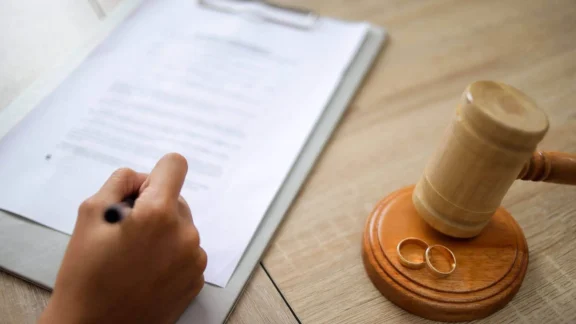Common law partners and cohabitation
It is important to understand the concepts of common law partners and common law marriage are not legally recognised in the UK, unlike some other nations where this status provides important rights and protections for a couple, akin to being married or in a civil partnership. As the law stands in the UK at present, no matter how many years you have been living together with your partner, you will never become “common law partners”.
Unfortunately, the term “common-law partner” is often misused to refer to long-term partners who have been living together at the same address on a permanent basis without being married or in a civil partnership. In the UK, this is actually called “cohabitation” or “living together”, not a common law partnership.
It is important to understand that cohabitating couples who are living together but not married do not have the same legal rights as married couples when they separate. Individuals who cohabit and later separate have no legal right to spousal maintenance or the property or money of the other person, as is the case after divorce or dissolution. For these reasons, it is always recommended for cohabiting couples to enter into a cohabitating agreement to put in place clear arrangements for finances, property and children in the event of separation or death.
Unmarried couple’s property rights
As an unmarried couple, you cannot claim ownership of the other partner’s property if you break up. If you live in the house that you rent together (i.e. you have a joint tenancy agreement), you are both legally responsible for meeting the terms of the agreement until it ends, even if you separate. If one of you wants to leave the property, then you will need to come to an agreement with the landlord to change the tenancy agreement into the name of the person who is staying.
If you both jointly own the property in which you live, you will need to come to an agreement with your ex-partner – e.g. one person may buy the other person’s share. How this is done, this will depend on whether you are joint tenants or tenants in common. It is also important to bear in mind that if one person dies and you are unmarried, the other joint owner becomes the sole owner, regardless of what is stated in the Will of the deceased.
If one person owns the property in which you both live, the other may have no right to continue living there. In some cases, it may be that the person who does not own the property can argue that they have contributed to the mortgage and upkeep of the house and make a case that they should have a share.
The situation is quite different between cohabiting couples and married couples. One legal benefit of marriage or civil partnership in the UK is that you are automatically entitled to an equal split of any marital property. This means that if you are married, you both own half of your house if you separate. It also means that you own the whole property if your partner dies.
Living together but not married rights on financial assets
If you live together with your unmarried partner, you will not have any right to their financial assets (e.g. money, investments, and pensions), and vice versa if you separate. This can pose a significant problem where one person is the main or sole income earner, and the other person gave up their occupation to raise their children at home.
If you have a joint bank account as a cohabiting couple, then in the event of separation, the money in that account remains jointly owned. You will then need to come to an agreement on how to take your share of the money from the account. It is still important to ensure that enough money is held in the account to cover any shared bills while a permanent arrangement is being made for your finances. In the event of the death of one person, the other person has access to all of the funds in the joint account. Also remember, any items purchased using funds from a joint bank account are considered joint assets.
If you have separate bank account as a cohabiting couple, if you separate, your accounts and the money in them will remain completely separate. In the event of death, neither person would have any right to the money in the other person’s bank account.
On the other hand, those who are married or in a civil partnership are automatically entitled to half of all financial assets, whether in a separate or joint account. In the event of death, all marital financial assets pass to the surviving spouse. However, this may not be the case, if financial assets have been placed into trust by one person to protect them from the other.
Unmarried couple’s responsibility for children
As the law stands in the UK, if an unmarried couple separates, sole parental responsibility goes to the mother in most cases. This is because the father is not named on the birth certificate. However, this may be different if the father is named on the birth certificate, gains parental responsibility, or if they enter into a parental responsibility order with the other parent. Even though an unmarried couple who separate may not no financial responsibility towards each other, both parents are responsible for contributing to the welfare and raising of their children. This means that child maintenance must still be paid by the parent who does not have day-to-day responsibility for the child to the other parent.
It is also important to consider that if you are in a cohabiting relationship and your partner has a child and you are not the biological parent, you may not have parental responsibility.
Where a couple are married, or in a civil partnership, the child’s father or partner of the mother can be registered on the birth certificate. This then grants them parental responsibility and the right to maintain a key role in the child’s life even after separation.
Unmarried couple’s pension, tax and insurance policy
As an unmarried couple, you will have no right to one another’s pension or life insurance policy. There are also important tax implications; for example, unmarried partners are required to pay a 40% inheritance tax on any assets inherited from their partner in the event of death (only if valued above the inheritance tax threshold). In addition, they cannot inherit any of their partner’s unused tax-free nil rate band (NRB) allowance. Unmarried couples also cannot take advantage of the married partners’ income tax transferable allowance. This allows the lower earner to transfer 10% of their personal allowance to their partner.
If you are married or in a civil partnership, you may receive money from the pension of your deceased partner. How this works will depend on whether the deceased had already retired or not. In addition, the surviving spouse may be eligible for an extra state pension payment. In terms of tax, married couples do not pay any IHT on assets that pass to the surviving partner.
Death and inheritance rights of cohabiting couples
If you are in a cohabiting relationship and your partner dies without a Will, you have no automatic right of inheritance. This is because the rules of intestacy which apply if there is not Will in place do not make a provision for surviving unmarried partners. It may be possible to make an inheritance act claim for reasonable financial provision in this situation, but there is no certainty as to the outcome.
If your cohabiting partner dies with a Will, then you will inherit the assets that they left for you. Again, if you believe that they did not make adequate financial provision for you, then you can make an inheritance tax claim to receive more.
Those who are married or in a civil partnership automatically have more rights when it comes to death and inheritance. This is because any marital assets automatically pass to the sole ownership of the surviving spouse.





